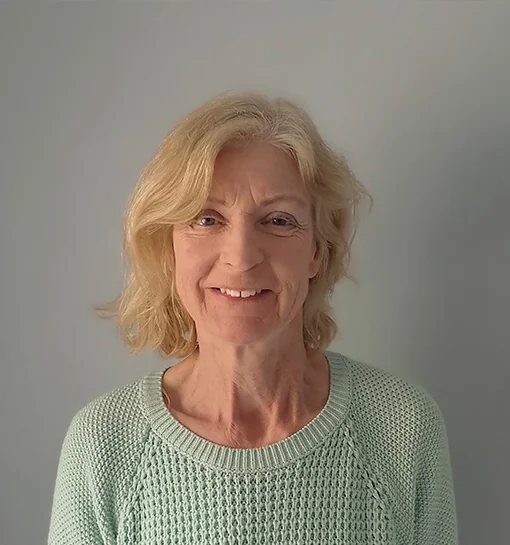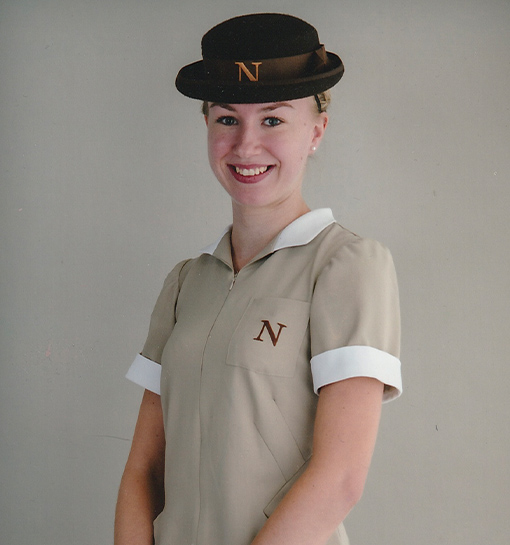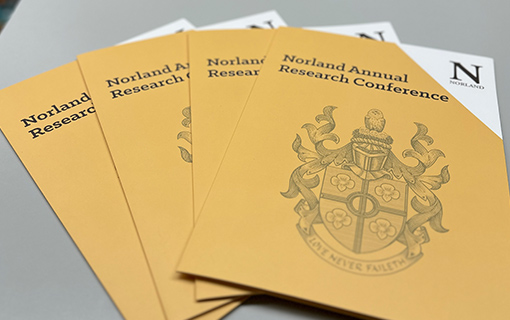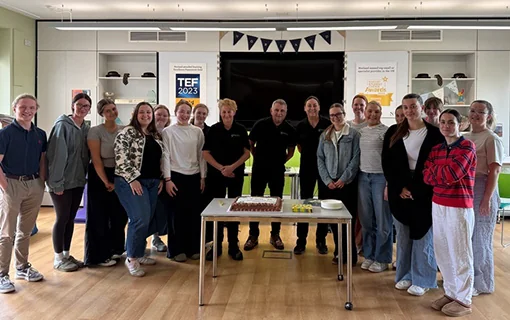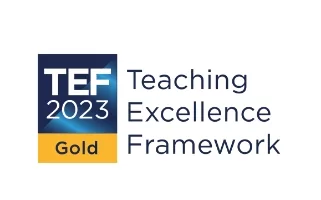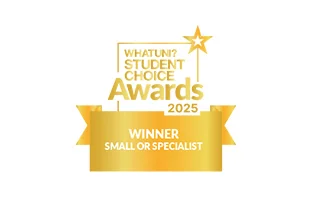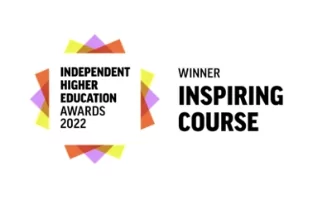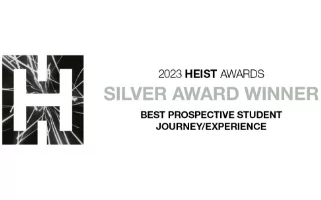Why LGBTQIA+ inclusive practice in the early years is so important
24 February 2021

Living in a diverse society is something that should be celebrated and it’s more important than ever that our course reflects the diverse society our students will go on to work in and the diverse families they will support.
Second-year student Aurora (Set 43) discusses how her passion for LGBTQIA+ inclusion stems from her own childhood and early years education and how this makes her more determined to provide inclusive care to the children she looks after.
Briefly introduce yourself.
My name is Aurora and I’m in Set 43. Before Norland, I went to Haverhill Community College where I studied Level 3 Extended Health and Social Care, Art A-level and BTEC Applied Science. Studying Health and Social Care meant I had to do 200 hours of placement; I worked in a nursery, care home, a special educational needs school, a private family and a charity shop. The extensive range of experiences I had in those two years helped me to understand what I was passionate about, which was ultimately the early years. The summer before starting my first year at Norland, I was an au-pair in France.
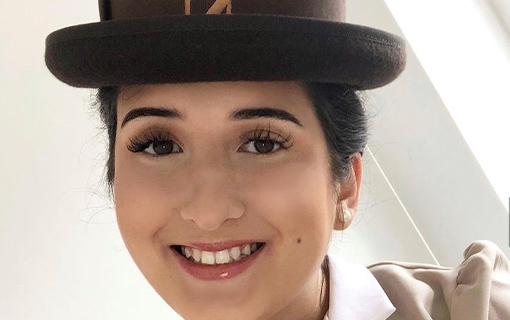
What have you learned during your work exploring LGBTQIA+ inclusion in the early years?
Despite already having an interest in diversity and inclusion, I have learned a lot during my studies of LGBTQIA+ inclusion in the early years at Norland and, in particular, about section 28 of the Local Government Act. The act was brought in to prohibit the ‘promotion of homosexuality’ by local authorities, including early years settings and schools. The law was partly sparked by a storybook called Jenny Lives with Eric and Martin by Susanne Bösche, which discusses different family relationships. It came into effect in 1988 and was revoked in the UK in 2003. This meant that it was still in place during my early childhood, which helped me to understand the lack of diversity experienced in my own education.
How has Norland supported your understanding of LGBQTIA+ inclusion in the early years?
My interest and understanding of LGBTQIA+ inclusion in the early years was furthered after our second-year modules working with children and families and thriving in a diverse society. Inclusion is a theme running throughout Norland’s course, with students looking at how they can apply different methods and practices to ensure all children and their families are properly cared for. Throughout the course, there are opportunities for students to choose specific areas to focus on. LGBTQIA+ inclusion is where my interest lies and what a lot of my research and assignments are focused on.
How can a nanny encourage critical thinking and positive self-image to support children to form non-discriminatory behaviours?
Children learn biases from adults in their lives, from the media, from books and peers. A child’s age is one of the most critical factors in considering how to begin a discussion on any subject dealing with discrimination or prejudice. The most important thing is that it is never too early, or too late, to talk to children about respecting diversity. Hate, after all, is learned and so can be unlearned. Education environments play an essential role in valuing diversity and are necessary for incrementing the inclusion of students. In the early years, an inclusive environment is where a child’s identity and attributes are cherished, empowering them to feel belonging within the setting. In the Early Years Foundation Stage (EYFS), the idea that ‘every child is a unique child’ determines that practitioners must facilitate each child’s learning needs and that these needs should be distinguished within an inclusive environment.
At around the age of two years, children notice physical aspects of identity, and they become increasingly aware of gender. As they notice differences, children may show signs of prejudice where they may act afraid or uncomfortable; they may not necessarily possess the vocabulary to express their concerns and avoid or ignore other children they perceive to be different. As children get older, they begin to show a greater awareness of their own and others’ differences, and it is not unusual for them to ask questions. This is normal, and so nannies need to be prepared to answer in an age and stage appropriate manner. We must prepare ourselves to respond to acts of bias, even if they are unintentional. Children will carefully observe how the adults in their lives intervene when someone is the target of such behaviour, silence conveys that adults condone the behaviour. We must make it clear to our children that this will not be tolerated.
When children hit school age, they begin to build a group identity and an individual identity. It is essential to keep these stages of development in mind when addressing issues of diversity. What is in a child’s environment (and what is absent) provides children with important information about who and what is important. Therefore, every effort should be made to create a setting and home environment rich in possibilities for exploring diversity. We should attempt to integrate diverse information into regular conversation and daily activities. Relegating this type of conversation to a specific holiday or month sends a message that these activities are unimportant relative to other activities; we must seek out opportunities to enforce anti-discriminatory behaviour all year round.
As practitioners, we need to look at ourselves and explore our own cultural biases and assumptions. What impacts how we view the world? What words are we using to teach our children about themselves and those around them? Do our actions match our words? Engaging in continuous professional development (CPD) and being a reflective practitioner can help unearth our own biases and behaviours, even when they are unintentional.
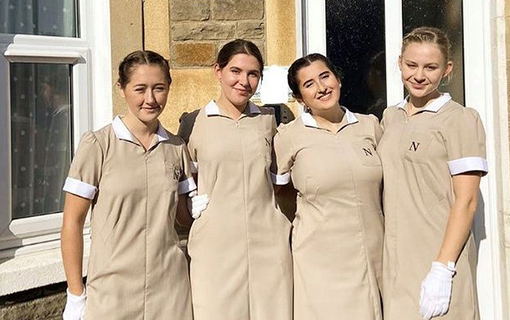
How can early years practitioners celebrate difference and challenge stereotypes?
The diversification of family demographics calls upon educators to develop an inclusive climate where they celebrate difference. In the early years, a child’s identity and self-esteem are heavily linked to their family. Children of LGBTQIA+ families need to see themselves and their family reflected in their environment; the books they read, the language they hear, and the TV and films they watch. This ensures that children and their families feel welcomed and have a sense of belonging, as opposed to feeling stigmatised. Practitioners can seek out training; Stonewall has a ‘getting started’ toolkit for practitioners on celebrating difference and challenging stereotypes.
What methods, activities or resources could you use to support their understanding of families that may be different to their own?
In September 2020, relationship education became compulsory for all primary pupils, including promoting different family dynamics. The early years still has no guidance on the inclusion of LGBTQIA+ families; nevertheless, the EYFS emphasises learning about differences. Practitioners can foster family representation through educational materials such as books and having open discussions. Using persona dolls and developmentally appropriate conversations through circle time provides children with the possibility to explore and express their feelings and beliefs. These activities can assist in the development of empathy and understanding, which combats heteronormativity.
As adults, we have the platform to demand progress. Children, however, have to accept what they are given access to. That is why it is our job to consume intentional diversity in children’s media. A lack of representation can cause lower levels of self-esteem and a lack of self-importance in children. Exposure to diverse content at a young age allows children to grow to be open-minded, accepting adults who are responsive to different people. For the children being told they are different, diverse media will enable them to see people similar to themselves represented. Children have no concept of deserving better because they only know what is handed to them. We must be responsible for combatting this and providing the diverse, uplifting content children deserve.
Stonewall has many excellent free resources available; some of my personal favourites are the ‘different families home learning pack’ and the ‘creating an LGBT inclusive primary curriculum’.
Reading and sharing books will always be my favourite activity to do with children. Some fantastic books I recommend are:
- Julian is a Mermaid by Jessica Love
- When Aidan Became a Brother by Kyle Lukoff
- The Bravest Knight Who Ever Lived by Daniel Errico
- Love Makes a Family by Sophie Beer
- Stella Brings the Family by Miriam B. Schiffer
- A Plan for Pops by Heather Smith and Brooke Kerrigan
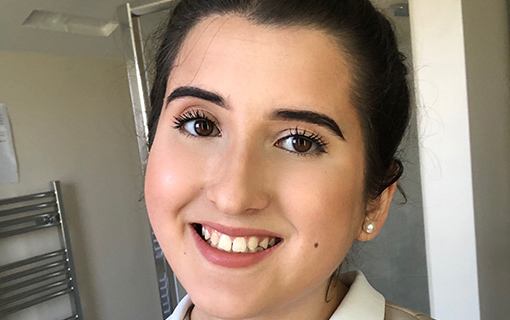
Is there anything you have been taught about on the course in relation to LGBTQIA+ inclusion in the early years that has changed your practice? What have you taken forward into your work with children?
I think the course has helped me understand how crucial the early years practitioner’s role is in inclusive practice. I developed lots of skills in reflective practice in my first year of study with the professional development module which allowed me to explore and tackle some of my own biases. Early years practitioners should begin to view diversity as a strength and asset to learning rather than a problem. Reflecting on how our own biases can impact practice is crucial to fostering inclusion. Early years professionals are equipping and preparing children to live in society; thereby, it transpires how critical their role is in providing inclusion within a diverse environment. It has also opened my eyes to exploring all kinds of diversity. Whilst many of today’s early years settings are diverse and inclusive environments, for as long as children face inequality and exclusion we can never claim that enough has been done.
Why is this topic of particular interest to you? Why are you so passionate about it?
The purposeful exclusion of LGBTQIA+ people during my own early years education has meant that I am very passionate that this does not happen under my care. I didn’t grow up in a nuclear family and, subsequently, understand what a lack of representation can do to a child’s identity and self-esteem. I have a personal interest having performed a speech on LGBTQIA+ rights in partnership with a local Cambridge charity during Cambridge Pride of 2015. During my time at Norland, I have often chosen it as the focus of various coursework, including an essay and an academic poster. The current climate has influenced my interests around this with the revised relationship education introduction in September 2020. I am part of the social justice team at Norland, a group run by students, and the anti-discrimination innovation team, which is a focus group made up of students, staff and alumni to ensure that Norland’s practice continues to be inclusive.
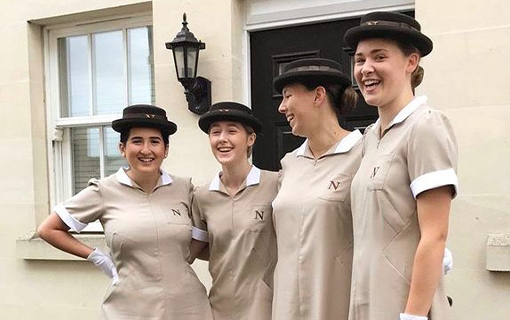
Browse our blog and latest news
